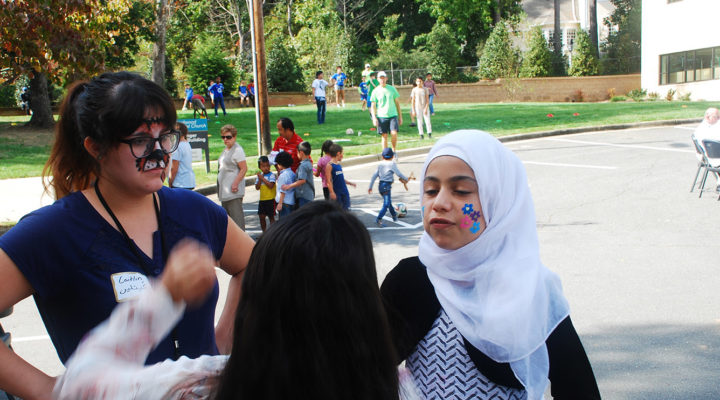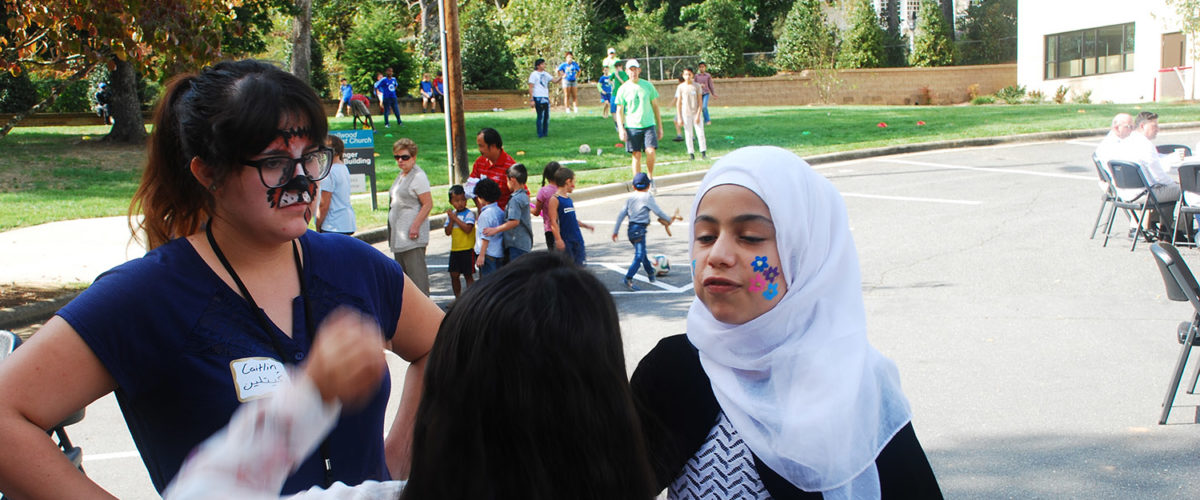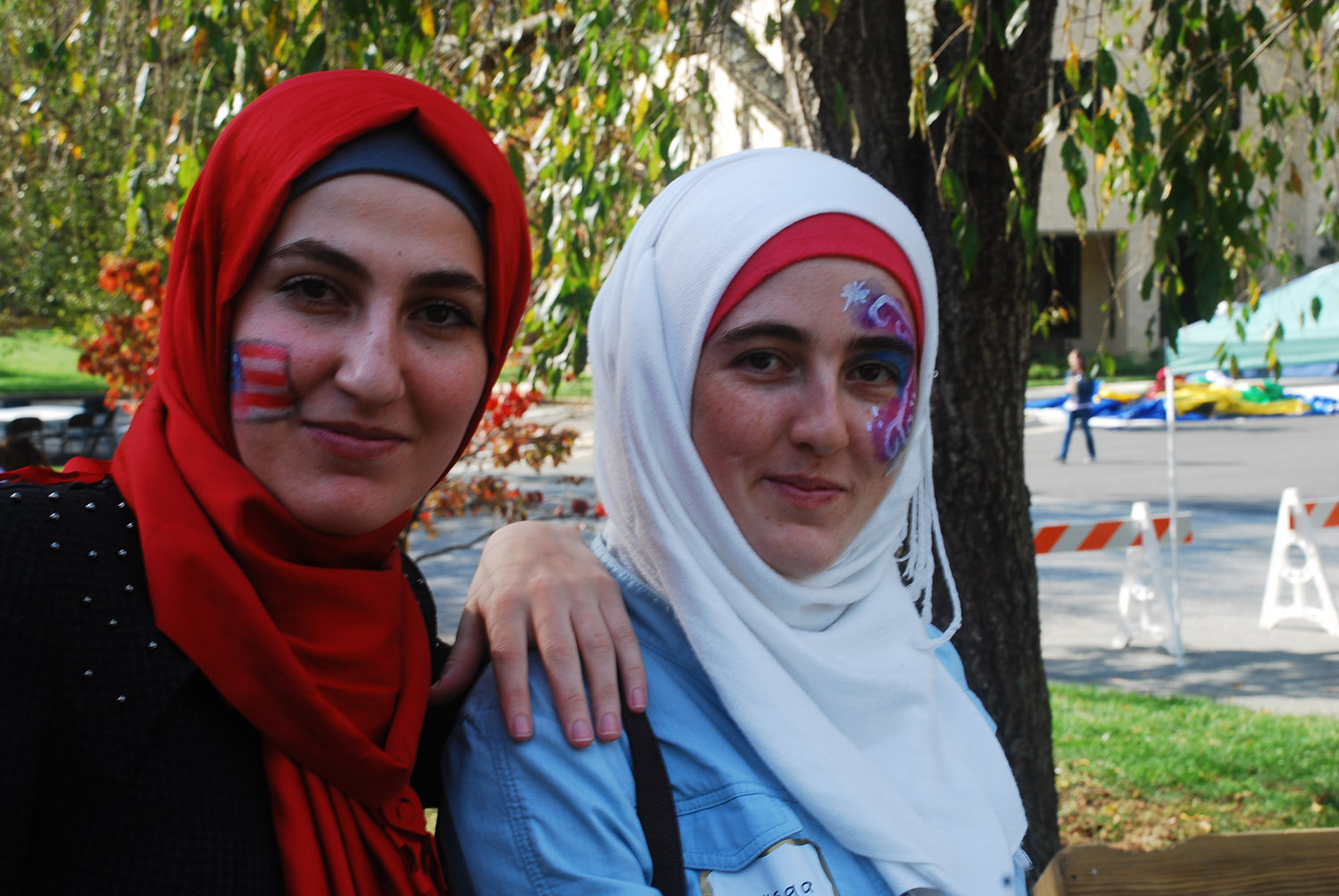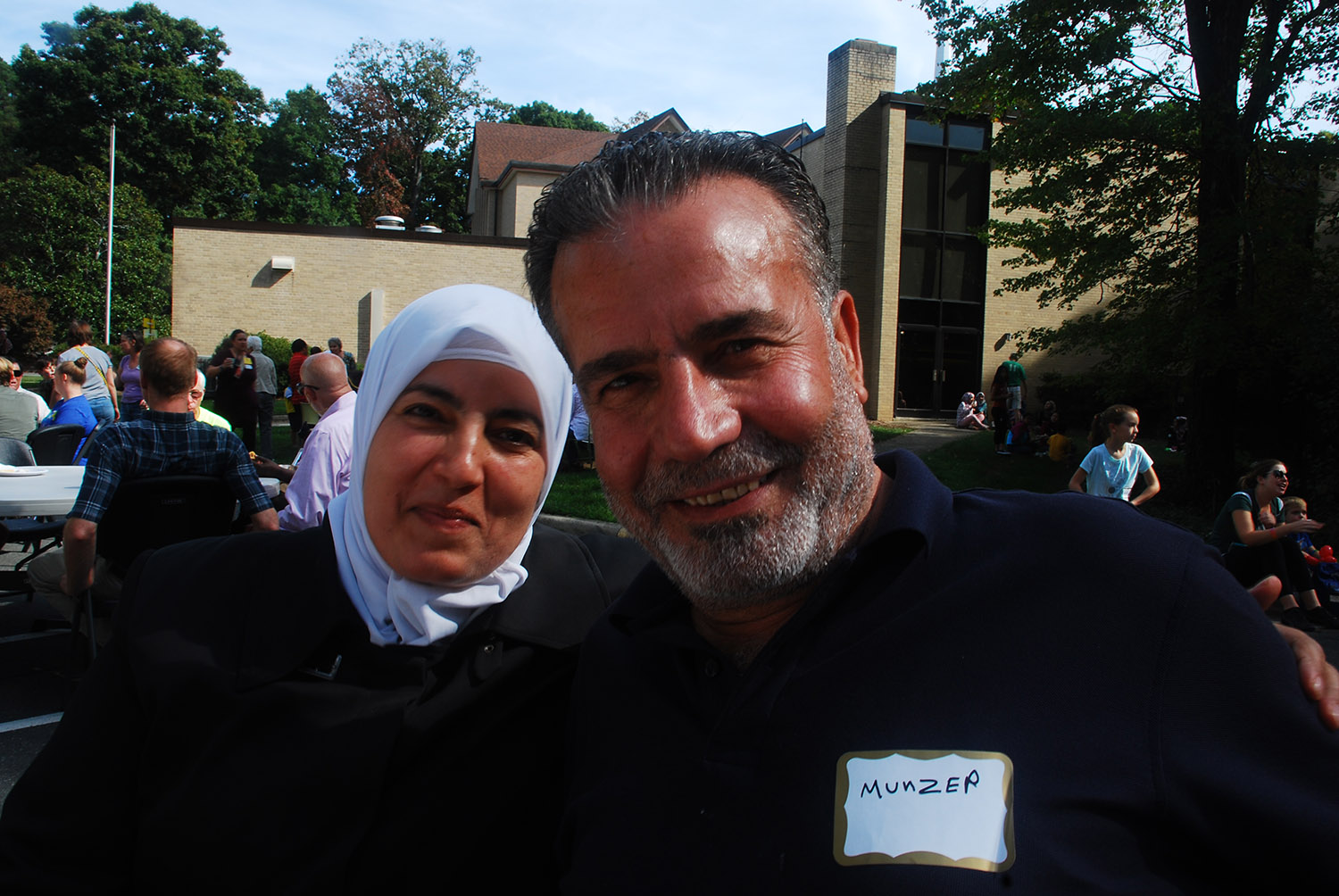America needs refugees as much as refugees need places like America, says Stephan Bauman, former president and CEO of World Relief, which has helped to resettle thousands of desperate wanderers.
Bauman addressed refugees and volunteers who have helped to make them at home during a “refugee welcome” event attended by more than 350 at Knollwood Baptist Church in Winston-Salem, N.C., Oct. 21. In the past two years, Knollwood has helped to settle four refugee families — three of them in partnership with Temple Emanuel, a Jewish community in the city. Their resettled families have been Muslim.
On a warm, bright fall Saturday a colorful international contingent of children played soccer and Frisbee, painted faces and slid down inflatable attractions in the parking lot while their parents ate and conversed with new friends from their various countries of origin, and with volunteers who have become like family.
Organizer Diane Lipsett said it’s important for children from different lands to play and eat together and for local children to see nothing abnormal about a woman in hijab. “We’re just making it a part of what happens in your church parking lot,” she said.
While other such relationship building events are not unique, organizer Diane Lipsett said this event paid special attention to why helping refugees “matters to our faith.” She led panel discussions with volunteers from three faiths, and had the entire discussion translated into both Arabic and Swahili so refugees primarily from Syria and the Congo would be fully integrated.
“Refugees remind us why America is great.”
Bauman, who this year became executive director of Cornerstone Trust, a grant management firm in Grand Rapids, Mich., said America needs refugees “so we can love one another, because we don’t naturally love each other.” The common task of service for others induces us to drop our regard for differences.
Resettling refugees, sometimes those from countries not friendly to the United States, shows us “how to love our enemies,” Bauman said. He said that Franklin Roosevelt’s greatest regret was turning refugees away when Europe was falling under the scourge of Nazism.
Additionally, he said, “Refugees remind us why America is great.”
“America is great, because America is good,” he said, quoting 19th century French historian Alexis de Tocqueville. He encouraged the volunteers, saying, “What you are doing, is good.”
Knollwood has been involved for many years in refugee resettlement, “but the climate is different now,” said Lipsett, minister of faith formation at Knollwood, and chair of the religion department at nearby Salem College. “Anxiety about people who are different is not new, and worry about security has been around.
“But in the last 10 months, there have been strange voices heard. There is a different kind of nationalism now.”
The quota of refugees to be resettled in the United States has been cut in half by the current presidential administration, even as the number of refugees in the world exceeds 21 million, the highest number in history.
Around tables in the parking lot, grateful refugees who often spent three to five years in miserable camps waiting for a nod of approval from a U.N. staffer to come to the U.S., say they do not intend to return home. There is nothing left to which to return.
Syrian panelist Maysaa, one of eight children settled in Winston-Salem with their parents six months ago, said Syria was an “amazing country,” and they had everything they needed. They lived in a four-bedroom house, with plenty of land. They turned away no one who needed help.
“We would go back, but the country is in ruin,” said her sister, Raghda. Her simple dream was to have “one night of sleep, just one night” of respite from the constant bombing. Although things had been disintegrating, the final straw came when “our neighbor’s house fell to the floor, from the bombing,” Raghda said.
Maysaa doesn’t know who was “throwing the bombs” that made the house collapse, or who blew up rescue workers who rushed to the house afterward. They were just caught in the middle.
Her family spent almost five years in a camp in Lebanon before resettling to the U.S. Here they are fascinated with American’s dependence on computers for everything from sending mail to handling money.
If they had used calculators in their math classes in Syria, they would have been thrown out, they said.
Other refugees, like Munzer, a geography teacher for 23 years in Syria, and Wasim, a barber, expressed their appreciation for the overwhelming support they’ve received, from hugs of welcome at the airport, to a furnished residence, to transportation and navigation of the myriad offices and departments they needed to visit. They relished the peace and camaraderie of the afternoon when children’s laughter rang through the crisp air, and not the concussions of bombs.
What of faith
Into this family reunion, Lipsett asked panelists to discuss what is it about their faith tradition that motivates them to help.
For Bob Schwartz, it is the Jewish tradition of “Tikkun olam,” the mandate to repair the world, “to make the world a better place.”
He told a story of a man committed to good works during his life, who was looking forward to his special reward after death. When he presented himself God told him there was no special reward for him. Doing the good work “is what we’re supposed to do.”
Dean Clifford, the driving force behind Knollwood’s refugee welcome teams, said her motivation is the New Testament command to “love God, and love your neighbors. And Jesus constantly stretched our concept of who is our neighbor.”
“We should emphasize what Jesus emphasized and not fuss about all the little things,” she said.
Christian Anna Rubin, leader of a team from Ardmore Baptist Church in Winston-Salem, said she came to know Jesus “through followers who gave me a sense of belonging, so that’s what I hope to do with refugees and others.”
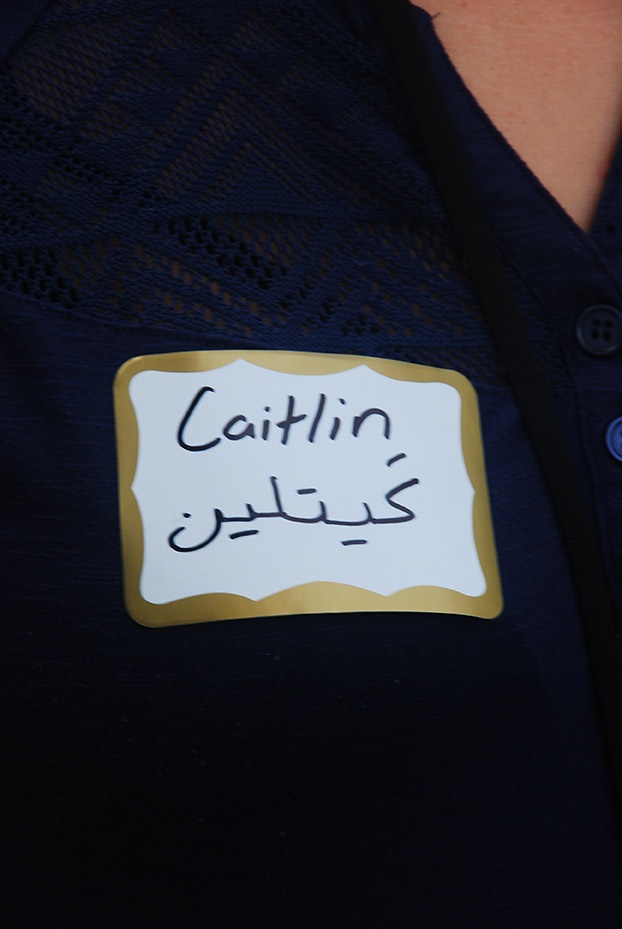 “A lot of people try to put people in groups, and say who is in and who is out,” she said. “Jesus said everyone is in and that’s the way I want to be too.”
“A lot of people try to put people in groups, and say who is in and who is out,” she said. “Jesus said everyone is in and that’s the way I want to be too.”
Muslim Dina Shehata, who works actively as an interpreter for many resettlement teams, said Muslims are taught to help those in need, and giving to another is first giving to yourself.
“We’re blessed to be able to do this in the first place,” she said. “It is them needing us. It is us needing them.”
In addition to exploring the motivation that faith provides to help others, Lipsett asked the panelists to share how their own faith has been affected by the work they do.
Rubin said her view of God, the world and His Kingdom “has gotten so much bigger.” An only child, she “now has brothers and sisters from around the world.”
Schwartz admitted that everyone is prejudiced, “but when you share a meal, you realize we’re more alike than different.
Clifford, 75, said the work is a privilege that “reminds us that we all worship the same God and God dwells in each of us.”
“This work keeps my hope alive that we can survive and love each other,” she said.
Panelists recognized that it is not just the faith of volunteers that motivates the work. But many of the refugees, if not most, credit their own survival to the gracious hand of God.
“These people go through unimaginable horrors,” Clifford said. “But their faith and courage allows them to survive.”

